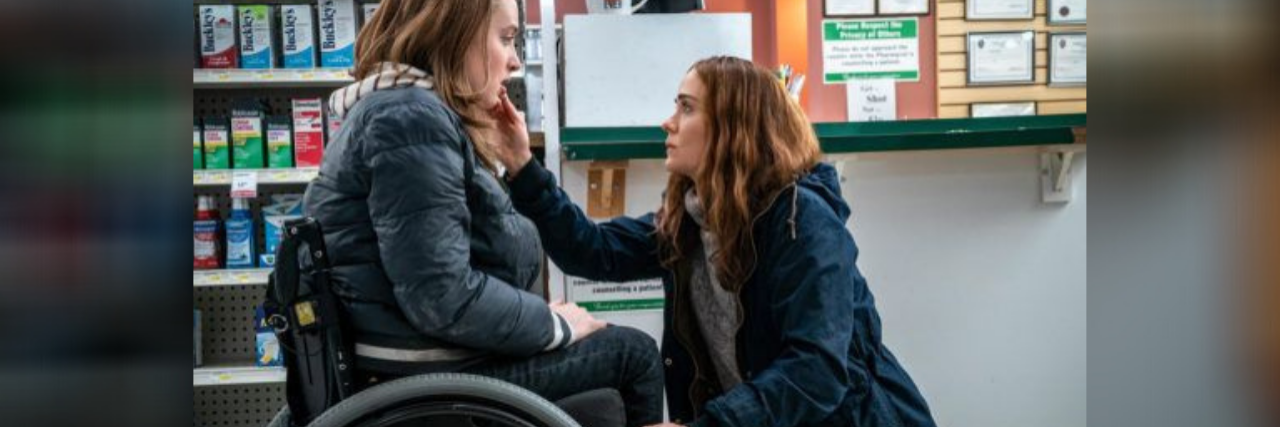Why the Hulu Thriller 'Run' Is Terrifying and Relatable for Many Disabled People
Editor's Note
This article contains spoilers for the movie “Run” and details about scenes involving emotional and physical abuse that could be potentially triggering. You can contact the Crisis Text Line by texting “START” to 741741.
I watched the new Hulu Thriller “Run,” featuring breakout disabled actor Kiera Allen and Emmy winner Sarah Paulson over my birthday weekend. As a disabled woman with cerebral palsy who loves classic horror movies, I was bewitched and terrified.
The movie opens in a classic fashion with a parental support group discussing their seniors’ upcoming high school graduation. Their eyes are stained with tears and muffled sobs, but Diane Sherman (Sarah Paulson) sits proudly and solemnly as she’s asked, “But aren’t you concerned about Chloe going to college?”
Diane bristles and says, “I’m not concerned. Chloe is strong, brave, and has faced more adversity than all of us. I’m not concerned at all for her.” What a fierce moment in cinematic history!
It was so easy for this movie to play into “classic” tropes about the disabled community, but as soon as Sarah Paulson uttered those words, I knew I was watching something truly groundbreaking in the making. Not just because Kiera Allen is the first actual disabled actress starring on the horror movie screen in 70 years, but because of the avoidance of pitying narratives.
At one point in the film, Chloe (Kiera Allen) rushes to the pharmaceutical desk amidst a line of able-bodied customers and pulls out “the disabled card,” while quipping, “Yes, I’m paralyzed, feel sorry for me and let me through the line.” I couldn’t help but chuckle as a disabled woman, knowing I’ve used the same line, and if people are just going to feel sorry for you anyway, why not? Disability has so few perks. That was a well-versed understanding of disability culture. Chloe didn’t have time for people’s pity; she was looking for answers like Nancy Drew meets “Child’s Play.”
As the film progressed, to my horror, I realized Chloe was a victim of factitious disorder imposed on another, also known as Munchausen syndrome by proxy (MSBP), a mental health condition in which a caregiver makes up or causes an illness or injury in a person under their care, such as a child, an elderly adult, or a person who has a disability. Diane even went as far as feeding her daughter medicine for dogs and isolating her with no phone or internet to assert ultimate control.
I was visibly shook watching this film. As a disabled woman who grew up with a parent who wanted to lock her up in a state institution because of her cerebral palsy, this movie struck a deep nerve. I understand this may not be the experience of most disabled people, but it’s certainly the case for some of us. Abuse of disabled children and adults doesn’t have to be as extreme as Munchausen syndrome by proxy. MSBP is very rare, but far too many parents view their kids with disabilities as incapable, and use their own fears as an excuse to control their kids and limit their opportunities.
“Without me, my special needs daughter couldn’t care for herself.”
“Without me, my daughter couldn’t possibly survive.”
Do these statements seem familiar to you?
Throughout the film, Chloe disproves this narrative over and over by taking actions such as tossing her paralyzed body out the window to escape a locked door and even throwing herself down the stairs after Diane has disconnected her wheelchair lift. Chloe shows tremendous resilience as a fearless disabled teen and navigates the world in her own way despite her mom’s attempts to keep her down.
I hope people watch this film filled with terror. It’s a suspenseful psychological experience, but if you’re a parent of a disabled child, I want you to understand how powerful your disabled children truly can be. There’s a difference between helping your disabled child and flat out underestimating what they are truly capable of, and it often happens in the subtleties and under a shield of protection. “My disabled child needs help with medicines.” Chloe gives herself her own insulin injections despite Diane wanting to assist constantly.
Disabled children become disabled adults and we yearn for independence and freedom, as Chloe does with wanting to attend college. I also faced skepticism from my family for wanting to attend college and live in a dormitory. “Erin, it will awfully difficult for you to get around campus in a walker,” they said. Indeed it was, but not impossible.
I hope this film will lead to more authentic disabled representation in Hollywood with hiring disabled actors and more authentic disability narratives, even if they make the general public feel uncomfortable. Lack of medical care and abuse of disabled people aren’t comfortable topics, but we need to keep talking about them.
Image via Hulu.

